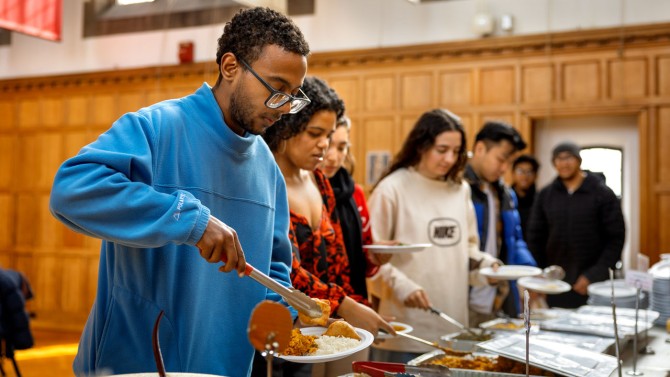
Maya Blanchard '26 (right) and Osama Awadalla ’25 are members of a new student group, the Jewish Muslim Alliance, that aims to build bridges between the Muslim and Jewish student communities at Cornell.
Second interfaith dinner aims for friendship and joy
By Caitlin Hayes, Cornell Chronicle
When Osama Awadalla ’25 attended a pro-Palestinian rally in front of Day Hall on Oct. 25, he was curious about the Israel supporters gathered across Feeney Way.
Awadalla, who is Muslim, joined a group of students in crossing the street and began a conversation – one that lasted three hours.
The students introduced themselves, explained their backgrounds and attachments to the Israel-Hamas war, their thoughts about the rally and what it made them feel. Not only did it humanize opposing beliefs for Awadalla, it left him hungry for more.
“That’s really how it started for me,” said Awadalla, a member of a new student group, the Jewish Muslim Alliance, and one of the organizers of the second interfaith Community Care Dinner, to be held Feb. 21 in Anabel Taylor Hall. “I just want others to experience talking to people with different viewpoints because it showed me how I was sort of in my own echo chamber, and also how you could have a conversation that wasn’t necessarily about changing anyone’s mind but about humanizing other viewpoints. It’s been an important part of my education.”
The second Community Care Dinner will build on the energy of the first, held last December, when more than 80 Muslim and Jewish students and allies gathered to find common ground, build friendships and celebrate each other’s cultures. Organizers have the same aims for the second event; they hope to reach even more students and to strengthen bonds for returning students. The event will feature kosher and halal food, and facilitators at each table will offer prompts for conversation.
“We want to establish a connection between our communities first, to talk about who we are, where we come from, what our traditions are, before we launch into heated debate,” said Awadalla, a statistical science major in the College of Arts and Sciences and outreach chair for the student-run Muslim Educational and Cultural Association. “We’re throwing this event as a welcome back, and to encourage people to really get to know one another.”
The dinner is hosted by the newly formed Jewish Muslim Alliance, a group of 11 students, nine student leaders from Muslim and Jewish organizations on campus and two allies. The group came together after Hamas’ Oct. 7 attacks to build bridges between their communities. Supported by the Office of Spirituality and Meaning-Making, the group decided on and executed the first Community Care Dinner and has led a volley of invitations to shared events between Jewish and Muslim groups on campus.
In the immediate aftermath of the Oct. 7 attacks, Alliance member Maya Blanchard ’26, a biological sciences major in the College of Agriculture and Life Sciences and chair of holiday planning for Cornell Hillel, said she felt the Muslim and Jewish communities on campus were retreating into themselves.
“We were all grieving and hurting and scared and feeling alone,” said Blanchard, who is half-Israeli and has family in Israel. “I felt we needed a bridge between the two groups and that it would help if we came together.”
Blanchard was right – through the Alliance’s efforts and within the group itself, students have found comfort and understanding. They’ve also made friends.
“I feel like I’ve opened myself up to a whole different community at Cornell,” Awadalla said. “I didn’t have many Jewish friends at home, in California, so learning about a culture and being accepted with open arms – it’s given me a new way of learning. It’s been amazing.”
“Now I have new friends in the Muslim community who I truly like to hang out with,” Blanchard said. “Especially last semester, when things were very tense, I was a little apprehensive – like, will they judge me for my beliefs, or where my family is from? It’s so nice to realize that’s not the case.”
Finding common ground within the group has been easy, and sometimes surprising, students said. Blanchard recounted multiple instances where the faiths themselves overlap – where the word for a prayer is the same in both religions or the Hebrew and Arabic letters in a word are the same.
“The religions share the same roots, so it makes sense, but it’s still surprising to discover those similarities,” Blanchard said.
Members of the Alliance have found they share in their lived experiences as well, from the smaller challenges of finding halal and kosher food in Ithaca to bigger struggles, like how they are processing and grieving conflicts abroad.
“We all know what it feels like to have our families and our homes threatened and talked about, or not talked about enough,” Blanchard said. “So we have a lot in common. We all care deeply.”
The Alliance plans to host a number of additional interfaith events this semester – an interfaith Iftar, a breaking of the fast, during Ramadan, the holy month of prayer in Islam, and an interfaith Shabbat dinner, on the Jewish day for rest and family.
“Obviously, it’s really important to keep talking about politics,” Blanchard said. “But our events are also a way for us to get a glimpse of each other’s cultures and humanity, and to share and celebrate Muslim and Jewish joy.”
Media Contact
Get Cornell news delivered right to your inbox.
Subscribe

